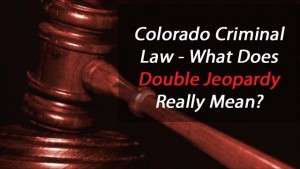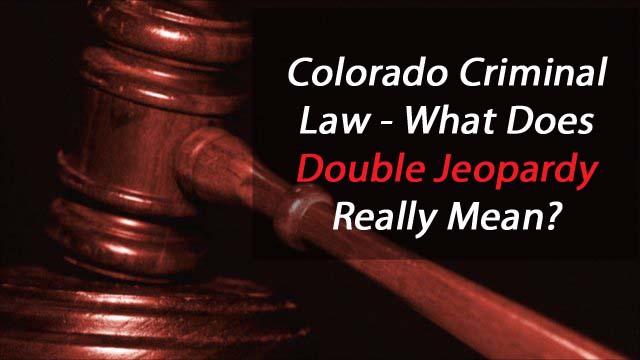




Colorado Criminal Law – What Does Double Jeopardy Really Mean?
By H. Michael Steinberg Colorado Criminal Defense Lawyer
 Colorado Criminal Law – What Does Double Jeopardy Really Mean? – The concept of Double Jeopardy in Colorado criminal law is not well understood. This article is intended to explain what it is and how it works in the criminal courts of Colorado.
Colorado Criminal Law – What Does Double Jeopardy Really Mean? – The concept of Double Jeopardy in Colorado criminal law is not well understood. This article is intended to explain what it is and how it works in the criminal courts of Colorado.
The concept of double jeopardy is very old.
In an ancient Roman speech – recorded for posterity – the Roman legislator Demosthenes stated: “The legislator does not permit any question once decided by judgement of the court to be put a second time ….”
Even in ancient Athens, in the last half of the fifth century – “[a] man could not be tried twice for the same offense.,
Another scholar wrote:
“The main concern of a man brought into court was to win a verdict by one means or another, for once tried he could not be prosecuted again on the same charge, the rule ne bis in eadem.”
Double Jeopardy In Colorado
The concept of being placed in “jeopardy” is this – when a person is charged with a crime in Colorado AND that case proceeds to one of two possible stages in the prosecution of that case – the person charged cannot be prosecuted a second time – that is – “placed in jeopardy” again – for those same charges.
[One primary exception – a mistrial – not addressed in this brief general article – is the exception to that general rule (see Mistrials).]To state it a different way – Jeopardy attaches when the defendant is:
“present at a judicial proceeding aimed at reaching a final determination of his guilt or innocence.”
A Defendant in a criminal case has been put in jeopardy under Colorado State’s Constructional Double Jeopardy Clause Colo. Const. Art. II, Sec. 18, when:
(1) he or she has been indicted or informed against and has pled not guilty;
(2) when the trial proceeds before a court with competent jurisdiction;
(3) when a jury has been impaneled and sworn (or in a judge or so called “bench trial” – when the first witness has been sworn).
The Effect Of A Judicial Finding Of Double Jeopardy – Double Jeopardy Law
Under both of the Double Jeopardy Clauses that apply in Colorado criminal cases – the Double Jeopardy Clause of the United States Constitution and the Double Jeopardy Clause of the Colorado Constitution, the State cannot punish a person for the same offense twice.
U.S. Const. amend. V
” [N]or shall any person be subject for the same offence to be twice put in jeopardy of life or limb . . . .” ;
Colo. Const. art. 2, § 18
“No person shall . . . be twice put in jeopardy for the same offense.”
This constitutional guarantee prohibits both a second prosecution for the same offense after acquittal or conviction and multiple punishments for the same offense.
To show a violation of the constitutional right “to be free from double jeopardy”, jeopardy must have attached at the first proceeding, that proceeding must have concluded, and the defendant must have been exposed to a second, or double, jeopardy.
To restate this principle – “jeopardy” attaches when the jury is sworn during a jury trial, when the first prosecution witness is sworn during a bench trial, or when the court has accepted a guilty plea. § 18-1-301(1), C.R.S.
The Double Jeopardy Clause – As It Has Been Codified Under Colorado Law – 18-1-301
What follows is Colorado’s encapsulation of the Double Jeopardy Clause in a statute:
§ 18-1-301. Second Trial Barred by Former Prosecution for Same Offense
(1) If a prosecution is for a violation of the same provision of law and is based upon the same facts as a former prosecution, it is barred by the former prosecution under the following circumstances:
(a) The former prosecution resulted in an acquittal. There is an acquittal if the prosecution resulted in a finding of not guilty by the trier of fact or in a determination that there was insufficient evidence to warrant a conviction. A finding of guilty of a lesser included offense is an acquittal of the greater inclusive offense even though the conviction is subsequently set aside.
(b) The former prosecution was terminated by a final order or judgment for the defendant that has not been set aside, reversed, or vacated, and that necessarily required a determination inconsistent with a fact or a legal proposition that must be established for conviction of the offense.
(c) The former prosecution resulted in a conviction. There is a conviction if the prosecution resulted in a judgment of conviction that has not been reversed or vacated, a verdict of guilty that has not been set aside and that is capable of supporting a judgment, or a plea of guilty accepted by the court. In the latter two instances, failure to enter judgment must be for a reason other than a motion of the defendant.
(d) The former prosecution was improperly terminated. Except as otherwise provided in subsection (2) of this section, there is an improper termination of a prosecution if the termination is for reasons not amounting to an acquittal, and it takes place after the jury is sworn if the case is tried by a jury or after the first prosecution witness is sworn if trial is by court following waiver of jury trial.
(2) Termination is not improper under any of the following circumstances:
(a) The defendant consents to the termination or waives his right to object to the termination. The defendant is deemed to have waived all objections to a termination of the trial unless his objections to the order of termination are made of record at the time of the entry thereof.
(b) The trial court finds that:
(I) The termination is necessary because it is physically impossible to proceed with the trial in conformity with the law; or
(II) There is a legal defect in the proceedings that would make any judgment entered upon a verdict reversible as a matter of law; or
(III) Prejudicial conduct has occurred in or outside the courtroom making it unjust either to the defendant or to the state to proceed with the trial; or
(IV) The jury is unable to agree upon a verdict; or
(V) False statements of a juror on voir dire prevent a fair trial.
The Double Jeopardy Clause encompasses several related “protections” – such as it:
- bars the government from prosecuting a person a second time for the same offense after he has already been tried and acquitted.
- prohibits the government from prosecuting a person a second time for the same offense after he has already been convicted.
- forbids the government from imposing multiple punishments upon a person for the same offense in successive proceedings.
- bars the government from prosecuting a person a second time for the same offense after a judge prematurely terminated his first trial, either by declaring a mistrial or by dismissing the charge against him before the fact-finder reached a verdict in the case.
Summary and Conclusion – Colorado Criminal Law – What Does Double Jeopardy Really Mean?
The brilliant design of the Double Jeopardy Clause was perhaps best expressed by Supreme Court Justice Hugo L. Black – who stated:
The constitutional prohibition against “double jeopardy” was designed to protect an individual from being subjected to the hazards of trial and possible conviction more than once for an alleged offense….
The underlying idea, one that is deeply ingrained in at least the Anglo-American system of jurisprudence, is that the State with all its resources and power should not be allowed to make repeated attempts to convict an individual for an alleged offense, thereby subjecting him to embarrassment, expense and ordeal and compelling him to live in a continuing state of anxiety and insecurity, as well as enhancing the possibility that even though innocent he may be found guilty.
Colorado Criminal Law – What Does Double Jeopardy Really Mean?
If you found any of the information I have provided on this web page article helpful please click my Plus+1 or the Share buttons for Twitter and Facebook below so that others may also find it.
If, after reading this article, you have questions about your case and would like to consider retaining our law firm, we invite you to contact us at the Steinberg Colorado Criminal Defense Law Firm – 303-627-7777.
Never stop fighting – never stop believing in yourself and your right to due process of law. You will not be alone in court, H. Michael at your side every step of the way – advocating for justice and the best possible result in your case.
< ABOUT THE AUTHOR: H. Michael Steinberg – Email The Author at [email protected] – A Denver Colorado Criminal Defense Lawyer – or call his office at 303-627-7777 during business hours – or call his cell if you cannot wait and need his immediate assistance – 720-220-2277. Attorney H. Michael Steinberg is passionate about criminal defense. His extensive knowledge and experience of Colorado Criminal Law gives him the edge you need to properly handle your case.
ABOUT THE AUTHOR: H. Michael Steinberg – Email The Author at [email protected] – A Denver Colorado Criminal Defense Lawyer – or call his office at 303-627-7777 during business hours – or call his cell if you cannot wait and need his immediate assistance – 720-220-2277. Attorney H. Michael Steinberg is passionate about criminal defense. His extensive knowledge and experience of Colorado Criminal Law gives him the edge you need to properly handle your case.
“A good criminal defense lawyer is someone who devotes themselves to their client’s case from beginning to end, always realizing that this case is the most important thing in that client’s life.”
You should be careful to make a responsible choice in selecting a Colorado Criminal Defense Lawyer – and we encourage you to “vet” our firm. Over the last 40 plus years – by focusing ONLY on Colorado criminal law – H. Michael has had the necessary time to commit to the task of constantly updating himself on nearly every area of criminal law, to include Colorado criminal law and procedure and trial and courtroom practice. H. Michael works hard to get his clients the best possible results in and out of the courtroom. He has written, and continues to write, extensively on Colorado criminal law and he hopes this article helps you in some small way – Colorado Criminal Law – What Does Double Jeopardy Really Mean?

Other Articles of Interest:
- Mistrials in Colorado
- Colorado Criminal Law – Asking a Judge to Change a Sentence – a Sentence Reconsideration – Under Colorado Rule of Criminal Procedure 35(b)
- DUI Cases II
- Colorado Juvenile Criminal Law and Issues – Common Motions – Police Stops
- Health Care Fraud












